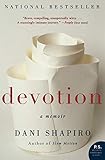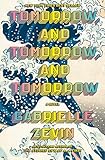Signal Fires is Dani Shapiro’s eleventh book and her first work of fiction in 15 years. It’s a significant departure from her last four books, all memoirs, the most recent of which is 2019’s Inheritance, which explores Shapiro’s discovery that the man who raised her was not her biological father. But whether she is writing fiction or nonfiction, family secrets (not coincidentally, also the name of Shapiro’s popular podcast) and how they ricochet through time remains her chief occupation.
In Signal Fires, the circumstances surrounding a tragic accident from 1985 continue to haunt the members of the Wilf family in the present day. Bound by their shared secret, each of the Wilfs privately grapple with their own culpabilities. But their efforts to bury the past are thrown into flux as the family’s patriarch, Ben, grows close with their new neighbors, the Shenkmans—and in particular, the Shenkmans’ son Waldo, a tender but wise 11-year-old with an expansive view of the world.
Shapiro began work on the novel in 2010, but it remained unfinished until the strange, sprawling days of quarantine in 2020 led her back to the manuscript. As a longtime student in Shapiro’s private writing workshop, I was curious to hear how she dealt with the challenge that finishing this story presented. We spoke over Zoom about her prismatic creative practice and the lessons of patience.
Rebecca Wallwork: Some years ago, I recall you sharing with our workshop group that you’d hit a wall with a novel. Were you referring to this book?

Dani Shapiro: Yes. After Devotion came out in 2010, I found myself turning back to fiction. I had these characters who were very real and present. They were speaking to me; I knew them. But I was attached to this idea that I was going to tell this story backward in time. That’s how I wrote myself into a wall and ultimately into a drawer. Because if you keep on writing backward in time, you know, the 11-year-old boy in 2010 is born in 1999, but then after that he’s gone. And I couldn’t write this book without Waldo, who was the beating heart of the book for me. I had this fixed idea, and I couldn’t at that time reimagine it.
RW: How did you deal with being stuck?
DS: Somehow, I was incapable of heeding what I would say to anyone else, which would be: Don’t be so attached to an idea. Don’t let the structure lead you rather than allowing it to unfold. I felt that I was doing some of the best writing, on a sentence level, that I had ever done, but I couldn’t tell the story. In despair, I had a conversation with Jennifer Egan and she said, “Well, if you’re upending chronology, upend chronology. Telling a story linearly but backwards is still chronological. Why not break it apart?” I knew that she was right—but I had absolutely no idea how to do it.

It’s hard to admit failure. I was on my way to Sirenland, the writer’s conference in Positano that I direct, thinking, How do I teach my workshop there? 10 writers are putting their faith and trust in me. Do I share this? And it became apparent that I had to, that talking about this kind of experience is part of the process. On the final night of the conference, I read from those early pages, and when I looked out at the audience, there were people crying, totally engaged with these characters. I felt like the characters had had this life on this one night in Positano. I was very sad about it, but after a while, I began work on Still Writing. I also ended up taking a couple of the characters, Shenkman and Lindgren, and wrote a short story about them that was published in Electric Literature and recorded as a short audiobook.
RW: How much of the book had you written in 2010?
DS: Around 120 pages. I had the sections that took place in 2010 and on New Year’s Eve 1999. I didn’t have what ultimately became the sort-of prologue. I knew something about what had happened in those pages, but I hadn’t wrapped my arms around it yet.
RW: You came back to these pages in 2020, when you found them cleaning out your office closet. What was the way back in?
DS: A few things happened. I sat on my office floor and I reread those 120 pages. I went downstairs and I said to my husband, “It doesn’t suck!” I was kind of enlivened by the pages and I thought, Oh! It was a mind-exploding kind of moment. I had written about one night in 2010, and another as the year was becoming 2000. Now it is 2020. That’s how it went: “It’s 2020. Who would they be now?” The minute I asked myself that question, it came like a flood. Waldo would be a brilliant student of astrophysics. Ben would be older—where would he be, living through the pandemic? Theo is a chef—food is love for him, solace. What would he be doing? I know people in that world and how they were trying to feed people. Suddenly, there it was. I understood that there was going to be a layer in the book of 2020. But when I sat down again, the very first thing I did was write the opening.
RW: That opening chapter reminded me of something you used to say in workshop, that the ‘“what happens” is not the story. It’s how it reverberates.
DS: I love that, and I hadn’t put that together in my own mind, in that way. But yes, I knew that some of these characters were haunted by something that happens for which there are no outward repercussions—although there are seismic internal repercussions that then shape much of their lives. I was interested in the aftermath. But in order to write the aftermath, I had to write these kinds of explosive opening pages. I also wanted to set up that there was a narrative voice that moves from the present to the past to the future. I somehow knew that the first word of the whole book needed to be “And.” It was the feeling that the story was already happening. If everything we do matters, and if there are ripple effects in every direction for every action, every choice, every decision, then it felt like it had to be “And.”
RW: Was there anything from your memoir writing practice that you drew on as you returned to fiction?

DS: Hourglass is one of my own books that’s closest to my heart, and I learned a lot about structure and writing in a mosaic-like form for that book. After Hourglass, I would say to people, “I’ve broken up with straightforward narrative, I’m done.” And I was excited by that. I wanted to write fiction that allowed for that kind of shuffling of time. The work that I’m drawn to, whether it’s fiction or memoir, tends to be kaleidoscopic or collage-like.
RW: Did the experience of unraveling your own family secrets that you write about in Inheritance inform Signal Fires at all?
DS: This is something I’ve been thinking about. In a way, some of the deepest themes in Signal Fires were there in what I started years before. It was painful to put the book in a drawer, and I didn’t think I would come back to it, if not for the pandemic. But it wasn’t only the pandemic—it was also the discovery that my father wasn’t my biological father. The new knowledge about the ways in which we connect to each other, often without knowing why. The sense that we don’t always know how the people we encounter will impact us or how we impact them.
My understanding of a lot of things deepened over the years that Signal Fires was in a drawer, and that next decade is what allowed me to return to it. That’s why on my computer, the file name for the book was “Magic Novel.” Because it felt magical to me that it had reemerged. And because there’s a little bit of magic in it that I wanted to honor.
RW: Where do you find literary inspiration now?

DS: Anne Truitt’s books have been lodestars for me. She’s been gone for a long time, but every time I sit down with her work, I feel like I’m learning from her. I feel that way when I reread the diaries of Virginia Woolf, or when I read old Paris Review interviews. My son is constantly giving me books to read. He recommended Tomorrow, and Tomorrow, and Tomorrow, which I’m reading now, and I believe he first turned me onto Emily St. John Mandel and Ling Ma. He’s got good taste. Also just having regular literary conversations, and knowing who to have them with.
RW: You mentioned Jennifer Egan’s advice earlier. In your acknowledgements you say that she reminds you by example that “the high wire is the only place worth being.” I’m curious how that might inform what you write next.
DS: The older I get, the less interested I am in playing it safe. If I’m going to lock myself in my room and spend years out of step with the rest of humanity in order to write a book, I might as well be aiming for the bleachers (to totally mix a metaphor). When I lock my door and go back inside the world of a book, I imagine I will stay in the realm of fiction, since it took so long for me to get back to that realm—and I like it there.
The post Write the Aftermath: The Millions Interviews Dani Shapiro appeared first on The Millions.
Source : Write the Aftermath: The Millions Interviews Dani Shapiro













